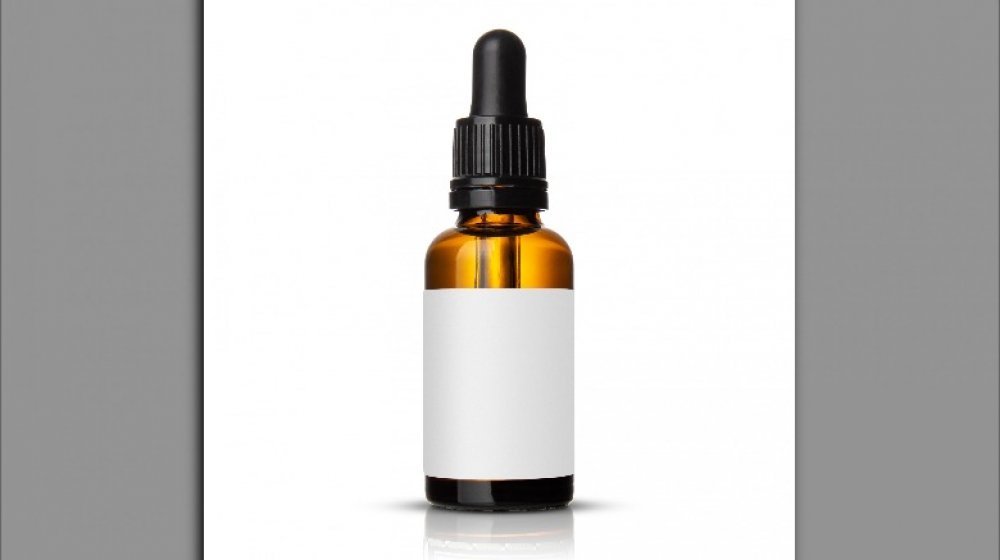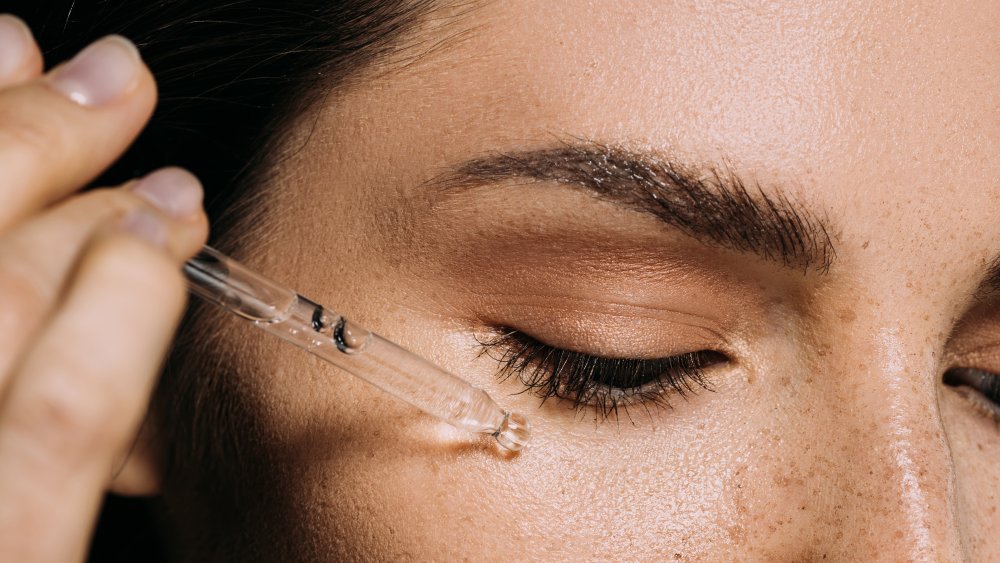How Vitamin C Serum Will Completely Transform Your Skin
Vitamin C serum has been around for a while, and it's fairly widely available both online and in stores — heck, even Dollar Tree offers a combo hyaluronic acid/vitamin C serum. Despite its being easy to come by and fairly inexpensive, vitamin C serum is a product so beloved by beauty experts that Allure refers to this substance as "legendary" and its active ingredient as "the holy grail of skin care."
Wow, some testimonial. So just what does vitamin C serum do for your skin that makes it worthy of such high praise? According to board-certified dermatologist Patricia Wexler, vitamin C has potent antioxidant properties which help it to neutralize free radicals, or, in other words, "aid... in your skin's natural regeneration process, which helps your body repair damaged skin cells." Not only does this mean that C serum can fight off signs of premature aging (meaning: wrinkles appearing at any age), but it may also be able to offer a certain amount of protection against UV exposure that can lead to skin cancer.
Other skin benefits of vitamin C serum
But wait, that's not all! Just in case helping ward off wrinkles and cancer wasn't enough for you, vitamin C serum can also boost your skin's collagen production, which Healthline says will also help prevent wrinkles. What's more, it can help to fade sun spots, age spots, acne scars, redness, and dark under-eye circles. Vitamin C serum is also hydrating in that it allows your skin to retain more of its natural moisture, and it can also smooth your skin's surface so your face will look brighter and clearer.
Yep, this is starting to sound pretty miraculous, all right. In fact, there are even a bunch of people claiming that vitamin C serum, at least one particular brand, has worked miracles when it comes to clearing up their acne (via Insider). So what can't vitamin C serum do? Well, it definitely won't make your brown eyes blue (nor should you even try putting it in your eyes, ouch). By all accounts, though, it will make the skin on your face softer, smoother, and more wrinkle-and-blemish-free than you'd ever believe you could get from anything — short of microdermabrasion.
What type of vitamin C serum should you choose?
When it comes to vitamin C serums, not all of these are created equal, although you don't need to spend big bucks to get a decent product. (Believe it or not, that Dollar Tree serum has nothing but 4- and 5-star reviews, mostly the latter.) Chatelaine says that a more expensive formula will not necessarily equal better results, but they do suggest looking for a brand that provides some sort of evidence to back up the results it claims, such as before-and-after photos or study results. Needless to say, such research (and advertising) is going to bump up the product cost a bit. You could also just do what most of us do when choosing a beauty product and read the online reviews instead.
There are, however, a few things you should be looking out for when it comes to the product's label and packaging. Chatelaine advises looking out for a C serum that comes in a dark glass bottle and/or opaque packaging, as these will help the product stay stable for longer. They recommend one containing 10 to 20 percent of the vitamin C derivative L-ascorbic acid that's been mixed with vitamin E for better absorption, although they also advise that products made with tetrahexyldecyl ascorbate will be the least irritating for first-time users. Healthline adds that serums containing ascorbyl palmitate or magnesium ascorbyl phosphate also work well.
How you should be using vitamin C serum
Vitamin C serum, unlike retinol, is perfectly safe for daytime use. In fact, Chatelaine says it's best to use vitamin C serum during the day, since it can help to protect your skin against sun damage and environmental pollutants. The best way to use it is to apply a few drops after you're done cleansing and toning but before you apply any moisturizer or sunscreen.
Vitamin C serum can also be used as a part of your nighttime moisturizing routine as well, since Healthline says it can be applied twice a day. They advise doing a "patch test" before you use it the first time, though — apply a small amount to a part of your skin that isn't as visible as your face (inside the elbow usually works well), then wait 24 hours. If there's no redness or rash or other irritation, it should be safe to start using on your face.




